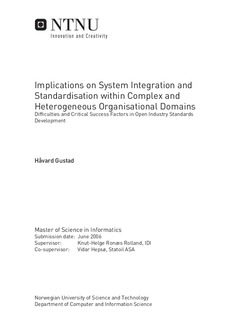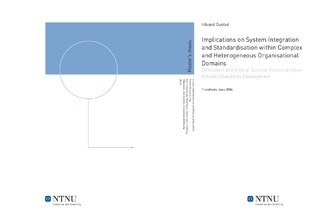| dc.contributor.advisor | Rolland, Knut-Helge Ronæs | |
| dc.contributor.advisor | Hepsø, Vidar | |
| dc.contributor.author | Gustad, Håvard | |
| dc.date.accessioned | 2018-11-05T15:01:05Z | |
| dc.date.available | 2018-11-05T15:01:05Z | |
| dc.date.created | 2006-06-01 | |
| dc.date.issued | 2006 | |
| dc.identifier | ntnudaim:1520 | |
| dc.identifier.uri | http://hdl.handle.net/11250/2571087 | |
| dc.description.abstract | Numerous standardisation and integration initiatives within the use of information and communication technologies (ICT) seem to fail due to lack of acknowledging the socio-technical negotiation that goes into standardisation work. This thesis addresses the implication of open standards development within organisational use of ICT. A standardisation initiative for data transmission, the PRODML project, within the domain of the Oil & Gas industry is investigated. This initiative strives to increase interoperability between organisations as it focus on removing the use of proprietary standards. By using Actor-Network Theory, this thesis try to articulate how such standards emerge, and the critical factors that can lead to their success. It emphasis the need to consider the importance of aligning interests in standards development, and the importance of creating the right initial alliance, building an installed base, for increased credibility and public acceptance. | |
| dc.language | eng | |
| dc.publisher | NTNU | |
| dc.subject | Informatikk, Systemarbeid og menneske-maskin-interaksjon | |
| dc.title | Implications on System Integration and Standardisation within Complex and Heterogeneous Organisational Domains - Difficulties and Critical Success Factors in Open Industry Standards Development | |
| dc.type | Master thesis | |

